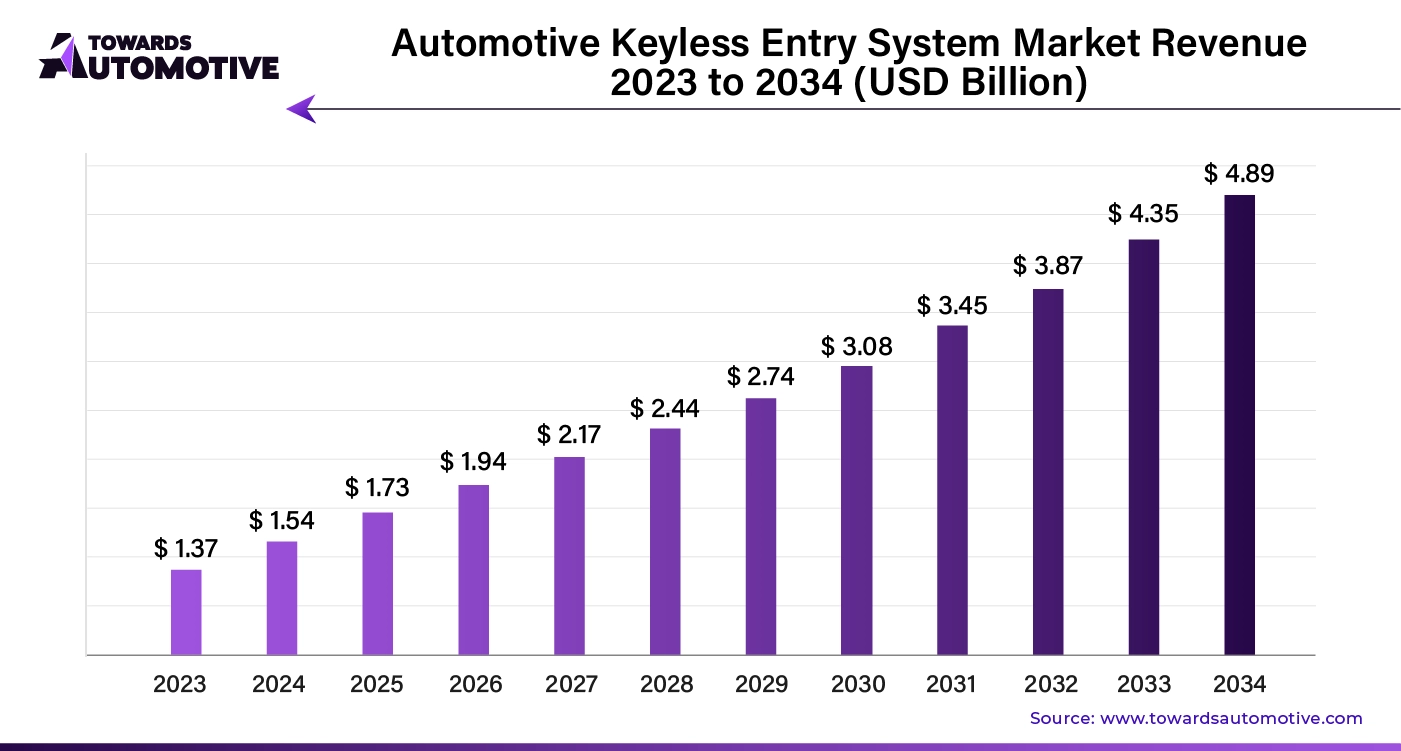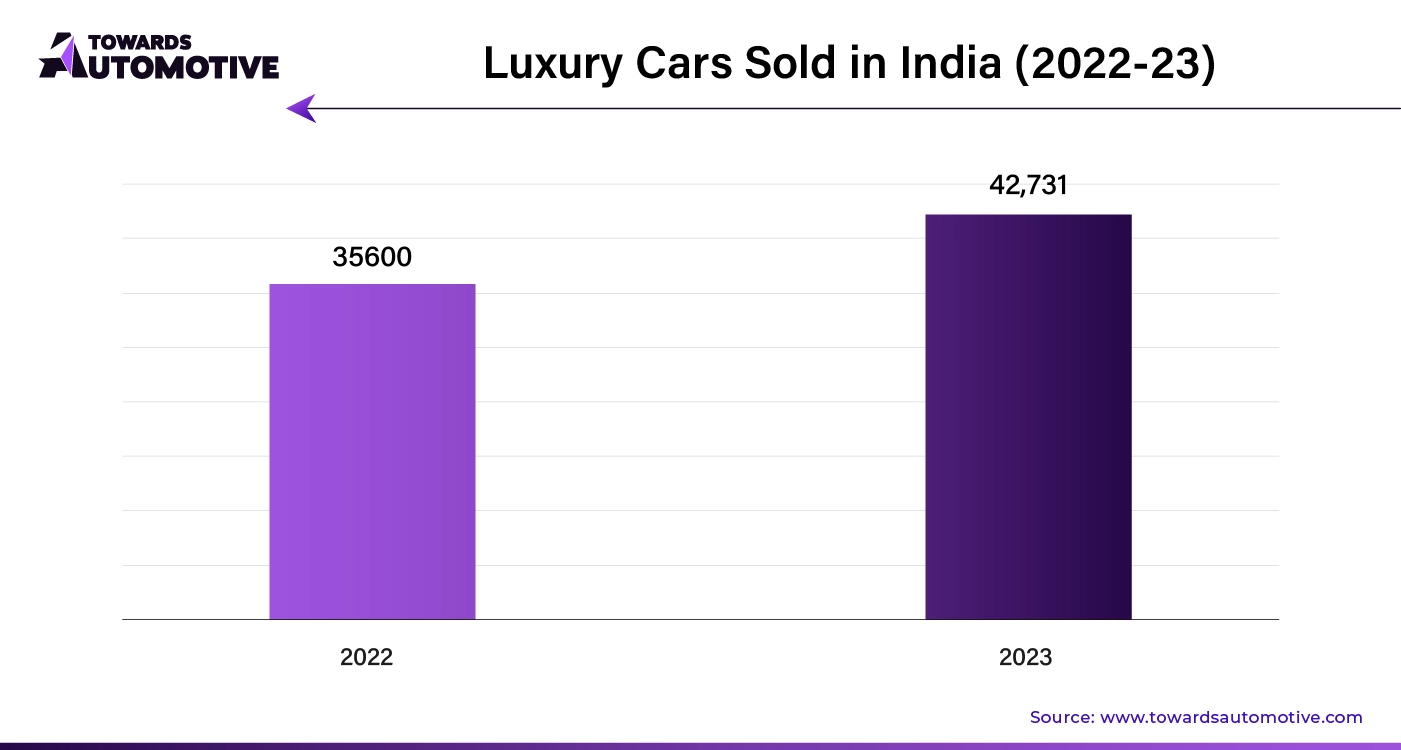April 2025

Senior Research Analyst

Reviewed By
The global automotive keyless entry system market size is calculated at USD 1.94 billion in 2024 and is expected to be worth USD 4.89 billion by 2034, expanding at a CAGR of 12.25% from 2024 to 2034.

The automotive keyless entry systems market is witnessing substantial growth, driven by advancements in vehicle security technologies and consumer demand for enhanced convenience. Keyless entry systems, which allow drivers to unlock and start their vehicles without using traditional keys, are becoming increasingly popular due to their ability to enhance security and improve user experience. These systems typically use radio frequency identification (RFID) or Bluetooth technology to communicate between the vehicle and a key fob, allowing seamless entry and ignition. The rise in connected vehicles and smart technologies is further propelling the demand for keyless entry systems.
Additionally, growing concerns about vehicle theft have led manufacturers to invest in more sophisticated keyless entry technologies, such as encrypted communication and biometric authentication, adding another layer of security. Increasing production of luxury and high-end vehicles, where keyless entry systems are standard, is also contributing to market expansion. With automakers continuously integrating new features like remote engine start and smartphone-controlled access, the market is expected to experience sustained growth. Moreover, the rising trend of electric vehicles (EVs) and autonomous driving is creating new opportunities for keyless entry solutions, as these vehicles rely on advanced systems to enhance their overall functionality.
AI plays a transformative role in the automotive keyless entry systems market by enhancing security, convenience, and personalization. One of the primary contributions of AI is in improving the accuracy and reliability of biometric-based keyless entry systems, such as facial recognition or fingerprint authentication. AI algorithms can analyze biometric data in real-time, allowing for faster and more secure authentication, reducing the risk of unauthorized access.
AI is also instrumental in predictive analytics, where it learns driver behavior and preferences to optimize keyless entry experiences. For example, AI-enabled systems can recognize patterns in driver proximity and automatically adjust vehicle settings, such as seat position or climate control, even before entry. These personalized features improve the overall user experience.
Moreover, AI enhances security by detecting anomalies or suspicious activities around the vehicle, such as attempts at forced entry. By using machine learning, AI can identify abnormal patterns and send alerts to the vehicle owner or take preventive actions, such as disabling the ignition system or locking the vehicle.
Additionally, AI integration allows for smarter connectivity between vehicles and mobile devices, enabling remote control and monitoring of the vehicle. This includes features like remote engine start, geofencing, and real-time location tracking, further boosting the appeal and functionality of keyless entry systems.
The growing demand for luxury cars is significantly boosting the automotive keyless entry systems market, as premium vehicles increasingly prioritize advanced security and convenience features. Keyless entry systems, which allow drivers to unlock, start, and access their vehicles without the need for traditional keys, have become a standard offering in luxury automobiles. The integration of these systems aligns with consumer expectations for seamless and sophisticated vehicle experiences. Luxury car buyers are particularly drawn to the convenience of touchless entry, remote access, and personalized vehicle settings, all of which enhance the user experience.
In addition to convenience, security remains a top priority for high-end vehicle owners, driving the adoption of more advanced keyless entry systems that incorporate encryption, biometric authentication, and AI-driven technologies. Automakers are responding to this demand by developing systems with enhanced security protocols to safeguard against potential hacking or theft, ensuring that luxury vehicles remain not only convenient but also secure.
Furthermore, the integration of AI and IoT (Internet of Things) in luxury vehicles has led to the development of more intelligent keyless entry systems that offer remote control features via smartphones or wearable devices. As luxury car manufacturers continue to invest in cutting-edge technology to differentiate their products, the demand for sophisticated keyless entry solutions is expected to grow, driving the expansion of the market in tandem with the rise of the global luxury automotive sector.

The automotive keyless entry systems market faces several restraints, including concerns over cybersecurity vulnerabilities and high development costs. With keyless entry systems increasingly relying on wireless communication and AI, they are more susceptible to hacking and signal interception, raising security concerns among consumers and manufacturers. Additionally, the high costs associated with integrating advanced technologies into vehicles, particularly in mid-range and economy models, can limit widespread adoption. Regulatory challenges related to data privacy and security standards also hinder market growth, requiring stricter protocols to protect users from potential threats.
The integration of smartphones into automotive keyless entry systems is creating significant opportunities in the market by enhancing convenience, security, and connectivity. As consumers increasingly rely on smartphones for daily activities, automakers are responding by developing keyless entry systems that allow drivers to control vehicle access using mobile apps. These systems enable users to lock, unlock, and start their vehicles remotely, providing a seamless and convenient experience without the need for physical keys or fobs. This trend is particularly appealing to tech-savvy consumers who prioritize advanced features in their vehicles.
Smartphone integration also introduces enhanced security features, such as biometric authentication (fingerprint or facial recognition) and two-factor authentication, reducing the risk of unauthorized access. Additionally, automakers are leveraging smartphones’ connectivity to offer real-time alerts, geofencing, and remote vehicle monitoring, further increasing the security and functionality of keyless entry systems.
Moreover, smartphone-enabled keyless entry systems support the growing trend of shared mobility and fleet management. Ride-sharing services and fleet operators can benefit from remote access control, allowing multiple users to unlock and start vehicles without the need to exchange physical keys. This streamlines operations and improves efficiency in fleet management, creating new opportunities for keyless entry solutions.
As more consumers and businesses adopt connected vehicle technologies, the integration of smartphones is expected to drive further growth in the automotive keyless entry systems market. This shift toward mobile-centric vehicle access is transforming the way drivers interact with their vehicles, offering a blend of convenience, security, and smart connectivity.
The remote keyless entry systems segment held the largest share of the market. Remote keyless entry (RKE) systems are a major driver of growth in the automotive keyless entry systems market, offering enhanced convenience and security to vehicle owners. These systems allow users to lock, unlock, and sometimes start their vehicles from a distance using a wireless transmitter, typically a key fob. The growing consumer demand for advanced vehicle access technologies, coupled with the increasing production of connected and luxury vehicles, is fueling the adoption of RKE systems across various vehicle segments.
One of the primary reasons for the popularity of remote keyless entry systems is the convenience they offer. By eliminating the need for a traditional key, drivers can access their vehicles more easily, especially in situations where manual unlocking may be cumbersome, such as in inclement weather or when carrying groceries. Additionally, many RKE systems offer added features like remote engine start, enabling drivers to start the car and adjust climate controls before entering, further enhancing comfort and convenience.
From a security perspective, RKE systems use encrypted signals to communicate between the key fob and the vehicle, reducing the likelihood of unauthorized access. This level of security is particularly attractive to consumers, especially in areas where vehicle theft is a concern. Automakers are continuously enhancing these systems with more advanced technologies, such as two-way communication and integration with smartphones, to boost security and offer added functionality.
With increasing consumer expectations for smart vehicle features, the demand for remote keyless entry systems is expected to continue driving growth in the overall automotive keyless entry systems market.
The passenger cars segment dominated the industry. Passenger cars are a key driver of growth in the automotive keyless entry systems market, as rising consumer demand for advanced vehicle technologies and enhanced convenience continues to shape the industry. Keyless entry systems, which allow drivers to unlock and start their vehicles without using traditional keys, are becoming increasingly common in passenger vehicles across various segments, from mid-range to luxury cars. This shift is driven by consumer preferences for seamless, user-friendly features that enhance the overall driving experience.
As automakers focus on incorporating smart technologies into passenger vehicles, keyless entry systems are becoming a standard offering, especially in new car models. These systems provide significant convenience, enabling drivers to unlock their cars remotely or with proximity sensors, reducing the need to fumble with keys in busy or challenging conditions. This is particularly appealing to urban drivers who value time-saving and hassle-free access to their vehicles.
Moreover, the rising adoption of connected and electric vehicles, many of which are passenger cars, is further fueling demand for sophisticated keyless entry systems. Electric and connected vehicles often integrate keyless entry with smartphone applications, offering additional features such as remote engine start, vehicle status monitoring, and enhanced security through mobile alerts.
With the global increase in passenger car production and sales, particularly in emerging markets, the demand for keyless entry systems is poised to grow. As a result, the passenger car segment is expected to remain a key driver in expanding the automotive keyless entry systems market.
North America dominated the automotive keyless entry systems market. The automotive keyless entry systems market in North America is witnessing significant growth, driven by a strong focus on vehicle security, the expansion of electric and autonomous vehicles, and the growing demand for luxury and premium vehicles. As vehicle theft and cybersecurity concerns rise, consumers and automakers are prioritizing advanced keyless entry systems that enhance security. These systems now incorporate cutting-edge technologies, such as encrypted communication and biometric authentication, to prevent unauthorized access, which is becoming increasingly critical in today’s market.
The rapid adoption of electric vehicles (EVs) and the anticipated rise of autonomous vehicles in North America are also fueling demand for more sophisticated keyless entry solutions. These vehicles rely heavily on smart, connected technologies, making keyless entry systems an integral part of their overall functionality. EVs, in particular, benefit from the convenience and seamless integration of smartphone-enabled keyless entry, which allows users to control vehicle access and monitor their cars remotely.
Additionally, the growing demand for luxury and premium vehicles in North America is another major growth driver. High-end vehicles typically come equipped with advanced features like keyless entry systems as standard offerings, catering to consumers who seek convenience, personalized vehicle access, and enhanced security. With affluent consumers driving sales of these vehicles, the demand for premium keyless entry technologies is expected to rise.
As these factors converge, the automotive keyless entry systems market in North America is poised for sustained growth, driven by a combination of security innovation, technological advancements, and consumer demand for convenience and luxury.
Asia Pacific is expected to grow with the highest CAGR during the forecast period. The automotive keyless entry systems market in Asia Pacific is experiencing robust growth, driven by rising vehicle sales and production, technological advancements, and an increasing demand for aesthetics. The surge in vehicle sales across the region, particularly in emerging markets like China and India, is significantly boosting the demand for modern automotive features, including keyless entry systems. As more consumers acquire vehicles, there is a heightened interest in advanced convenience features that enhance the driving experience and streamline vehicle access.
Technological advancements are also a crucial growth driver. Innovations in keyless entry systems, such as biometric authentication, smartphone integration, and IoT connectivity, are revolutionizing the market. These technologies not only offer enhanced security and convenience but also align with the region's growing appetite for smart, connected vehicle solutions. As automakers incorporate these cutting-edge features into their vehicles, keyless entry systems are becoming increasingly sophisticated and appealing to tech-savvy consumers.
Additionally, the demand for aesthetics plays a significant role in market growth. Consumers in Asia Pacific are placing greater emphasis on the design and functionality of their vehicles, including the integration of sleek and stylish keyless entry systems. Automakers are responding to this trend by developing keyless entry solutions that complement the overall design of the vehicle, offering both form and function. This focus on aesthetic appeal, combined with technological and production advancements, is driving the expansion of the automotive keyless entry systems market in the region, catering to the evolving preferences of modern consumers.

By Product
By Application
By Region
April 2025
April 2025
April 2025
April 2025
Dr. Arjun Patel is a distinguished expert in the automotive industry, holding advanced degrees in Automotive Engineering and Mechanical Engineering. His expertise spans automotive market dynamics, technological advancements, and sustainable practices. Dr. Patel excels in conducting in depth research and analysis on market trends, consumer preferences, and the economic implications within the automotive sector. He is renowned for his insightful publications on topics such as electric vehicles, autonomous driving technologies, and the evolution of sustainable transportation solutions. Dr. Patels research contributions have significantly advanced understanding in the field, earning him recognition as a leading authority in automotive research and analysis.
We offer automotive expertise for market projections and customizable research, adaptable to diverse strategic approaches.
Contact Us